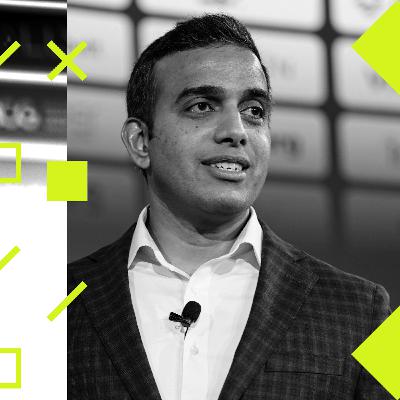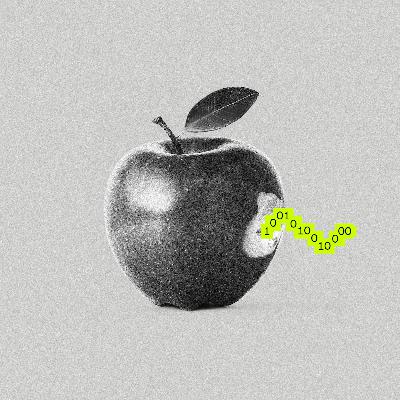Discover Decoder with Nilay Patel
Decoder with Nilay Patel

Decoder with Nilay Patel
Author: The Verge
Subscribed: 51,112Played: 1,065,212Subscribe
Share
© 2020 Vox Media, Inc. All Rights Reserved
Description
Decoder is a show from The Verge about big ideas — and other problems. Verge editor-in-chief Nilay Patel talks to a diverse cast of innovators and policymakers at the frontiers of business and technology to reveal how they’re navigating an ever-changing landscape, what keeps them up at night, and what it all means for our shared future.
898 Episodes
Reverse
Hey everyone, it’s Nilay. Decoder is on our holiday break. We’ve got a lot of fun stuff coming up in the New Year, though, including a special Decoder Live at CES. Stay tuned for more details, including how to RSVP for free tickets.
In the meantime, we’ve got a great episode of the podcast Channels, featuring two of the best media reporters in the business. Host Peter Kafka sat down with Bloomberg’s Lucas Shaw to talk about the bidding war between Paramount SkyDance and Netflix over Warner Bros. Discovery. It’s the biggest story in entertainment right now, and this episode breaks down everything you need to know about the contentious acquisition.
Links:
"Neither Side Is Used to Losing”: Lucas Shaw on the battle for Warner Bros. | Channels
Five things we’re getting wrong about Warner Bros.′ Netflix deal | Bloomberg
Warner Bros.’ bidders brace for a fight that will last months | Bloomberg
WBD wants its shareholders to reject Paramount’s latest offer | The Verge
There are no good outcomes for the Warner Bros. sale | The Verge
Netflix is “100% committed” to releasing WB films in theaters | The Verge
Netflix is buying Warner Bros. for $83 billion | The Verge
Subscribe to The Verge to access the ad-free version of Decoder!
Credits:
Decoder is a production of The Verge and part of the Vox Media Podcast Network.
Decoder is produced by Kate Cox and Nick Statt and edited by Ursa Wright. Our editorial director is Kevin McShane.
The Decoder music is by Breakmaster Cylinder.
Learn more about your ad choices. Visit podcastchoices.com/adchoices
Hey everyone! Decoder senior producers Kate Cox and Nick Statt here. We’ve had a big year, including nearly 100 episodes, a new YouTube channel, an ad-free podcast feed, and a slate of great guest hosts while Nilay was on parental leave. It’s been a lot!
We’ve also had a lot of great questions and comments this year from you, our audience. So we pulled together all the feedback we’ve received on topics like CarPlay, Monday episode guest suggestions, and — of course — AI. And then we turned the tables on Nilay to ask him his thoughts on the past 12 months: What we liked, what we want to improve, and how he’s making decisions for Decoder in the new year.
Links:
Answering your biggest Decoder questions, 2024 edition | Decoder
The DoorDash Problem | Decoder
How decision making changes when AI answers are cheap and (too) easy | Decoder
Why GM will give you Gemini — but not CarPlay | Decoder
Rivian CEO: ‘We’re really convicted’ about skipping CarPlay | Decoder
How SharkNinja took over the home, with CEO Mark Barrocas | Decoder
Why Tubi CEO Anjali Sud thinks free TV can win again | Decoder
Disney accuses Google of copyright infringement following OpenAI deal | The Verge
Subscribe to The Verge to access the ad-free version of Decoder!
Credits:
Decoder is a production of The Verge and part of the Vox Media Podcast Network.
Decoder is produced by Kate Cox and Nick Statt and edited by Ursa Wright. Our editorial director is Kevin McShane.
The Decoder music is by Breakmaster Cylinder.
Learn more about your ad choices. Visit podcastchoices.com/adchoices
Stack Overflow CEO Prashanth Chandrasekar was last on the show in 2022 — just one month before ChatGPT launched and upended literally everything for Stack Overflow in a deeply existential way.
He called a company emergency, reallocated about 10 percent of the staff to figure out solutions to the ChatGPT problem, and made some pretty huge decisions about structure and organization to navigate that change — all of it pure Decoder bait.
Links:
2025 Developer Survey | Stack Overflow
The people who make your apps go to Stack Overflow for answers | Decoder
OpenAI, Stack Overflow partner to bring technical knowledge to ChatGPT | The Verge
Stack Overflow feeds programmers’ answers to AI whether they like it or not | The Verge
Stack Overflow cuts 28 percent of its staff | TechCrunch
AI-generated answers temporarily banned on Stack Overflow | The Verge
Stack Overflow’s strike is over, but problems persist | Jon Ericson
A new era of Stack Overflow | Stack Overflow
Subscribe to The Verge to access the ad-free version of Decoder!
Credits:
Decoder is a production of The Verge and part of the Vox Media Podcast Network.
Decoder is produced by Kate Cox and Nick Statt and edited by Ursa Wright. Our editorial director is Kevin McShane.
The Decoder music is by Breakmaster Cylinder.
Learn more about your ad choices. Visit podcastchoices.com/adchoices
Massachusetts Sen. Ed Markey and I agree it seems like democracy is on the line right now, especially around the First Amendment and the increasing pressure the Trump administration — especially FCC chair Brendan Carr — is putting on free speech. I also had a lot of questions for Sen. Markey about the supposed TikTok ban, which no one seems to know anything about, and all the other problems we’re facing in 2025.
Links:
Even the lawmakers behind the TikTok ban have no idea what’s going on | The Verge
Carr’s FCC is an anti-consumer, rights-trampling harassment machine | The Verge
The FCC is a weapon in Trump’s war on free speech | Decoder
Here’s the Trump EO that would ban state AI laws | The Verge
Silicon Valley is rallying behind a guy who sucks | The Verge
Silicon Valley’s man in the White House is benefiting himself and his friends | The New York Times
Subscribe to The Verge to access the ad-free version of Decoder!
Credits:
Decoder is a production of The Verge and part of the Vox Media Podcast Network.
Decoder is produced by Kate Cox and Nick Statt and edited by Ursa Wright. Our editorial director is Kevin McShane.
The Decoder music is by Breakmaster Cylinder.
Learn more about your ad choices. Visit podcastchoices.com/adchoices
Today, I’m talking with Willem Avé, who’s the head of product at Square. You know Square — it was started by billionaire Jack Dorsey of Twitter fame more than 15 years ago, and it got big on the back of that little magnetic reader that once plugged into the headphone jack of the iPhone and let small businesses accept credit cards.
Nowadays, of course, Square is more than a credit card reader, and sadly, the headphone jack is ancient history. The company itself is now part of parent organization called Block, which is made up of a very interesting mix of financial services like Afterpay, Cash App, and, yes, the streaming music service Tidal. So Willem and I really got into where Square is headed next with AI and automation, why he’s excited about crypto and Bitcoin specifically, and even what it means that the US is discontinuing the penny.
Links:
Square’s public roadmap | Square
Jack Dorsey is reorganizing the entirety of Block | Fortune
How Block turned Square into a financial services giant | Fast Company
Block to roll out bitcoin payments on Square | Square
Square buys $170 million worth of bitcoin | CNBC
Square, Jack Dorsey’s payments company, changes its name to Block | NYT
The penny dies at 232 | NYT
Subscribe to The Verge to access the ad-free version of Decoder!
Credits:
Decoder is a production of The Verge and part of the Vox Media Podcast Network.
Decoder is produced by Kate Cox and Nick Statt and edited by Ursa Wright. Our editorial director is Kevin McShane.
The Decoder music is by Breakmaster Cylinder.
Learn more about your ad choices. Visit podcastchoices.com/adchoices
Today, I’m talking with Verge senior AI reporter Hayden Field about some of the people responsible for studying AI and deciding in what ways it might… well, ruin the world. Those folks work at Anthropic as part of a group called the societal impacts team, which Hayden just spent time with for a profile she published this week on The Verge.
The team is just nine people out of more than 2,000 who work at Anthropic, and their only job, as the team members themselves say, is to investigate and publish quote "inconvenient truths” about AI. That of course brings up a whole host of problems, the most important of which is whether this team can remain independent, or even exist at all, as it publicizes findings about Anthropic's own products that might be unflattering or even politically fraught.
Links:
It’s their job to keep AI from destroying everything | The Verge
Anthropic details how it measures Claude’s wokeness | The Verge
White House orders tech companies to make AI bigoted again | The Verge
Chaos and lies: Why Sam Altman was booted from OpenAI | The Verge
How Elon Musk Is remaking Grok in his image | NYT
Anthropic tries to defuse White House backlash | Axios
New AI battle: White House vs. Anthropic | Axios
Anthropic will pursue gulf state investments after all | Wired
Subscribe to The Verge to access the ad-free version of Decoder!
Credits:
Decoder is a production of The Verge and part of the Vox Media Podcast Network.
Decoder is produced by Kate Cox and Nick Statt and edited by Ursa Wright. Our editorial director is Kevin McShane.
The Decoder music is by Breakmaster Cylinder.
Learn more about your ad choices. Visit podcastchoices.com/adchoices
IBM was instrumental to the entire 20th century of computing — but it's a lot harder for most of us to see what it's been up to during this century. That's because it's fully an enterprise company, and CEO Arvind Krishna says that business is booming.
But there’s a huge change coming to that business as well, as Watson-style deep learning has given way to LLMs and generative AI. Sure, Arvind says IBM got there a little too early. But he doesn’t seem concerned that IBM would be stuck on the sidelines.
Read the full interview transcript on The Verge.
Links:
Computer wins on ‘Jeopardy!’: Trivial, it’s not | New York Times (2011)
What Ever Happened to IBM’s Watson? | New York Times (2021)
America Forgot About IBM Watson. Is ChatGPT Next? | The Atlantic
IBM acquires Red Hat | The Verge
IBM and Groq Partner to Accelerate Enterprise AI Deployment | IBM
IBM’s Jerry Chow on the future of quantum computing | Decoder
IBM: quantum computing partnership with AMD is bearing fruit | The Verge
Subscribe to The Verge to access the ad-free version of Decoder!
Credits:
Decoder is a production of The Verge and part of the Vox Media Podcast Network.
Our producers are Kate Cox and Nick Statt. Our editor is Ursa Wright. Our editorial director is Kevin McShane.
The Decoder music is by Breakmaster Cylinder.
Learn more about your ad choices. Visit podcastchoices.com/adchoices
Hey everyone, it's Nilay. It’s been great being back in the Decoder chair this fall, and we’ve got a bunch of great episodes coming up to round out the year. But the production team is off this week for the holiday, so today, we’re going to share this episode of The Gray Area with you.
This time, host Sean Illing is talking to data scientist Hannah Ritchie — about climate science and how although the crisis is definitely real, it’s not all bad news. There are actually a lot of great indicators out there in the data that show real progress in limiting emissions and boosting clean energy. It’s a nuanced, hopeful take at a time when, admittedly, it kind of feels like all the news about everything is pretty doom and gloom.
Links:
We can have growth while fighting climate change | Vox
The Grey Area | Apple Podcasts
Clearing the Air | Hannah Ritchie
Subscribe to The Verge to access the ad-free version of Decoder!
Credits:
Decoder is a production of The Verge and part of the Vox Media Podcast Network.
Our producers are Kate Cox and Nick Statt. Our editor is Ursa Wright.
The Decoder music is by Breakmaster Cylinder.
Learn more about your ad choices. Visit podcastchoices.com/adchoices
Okay, let’s talk about AI and what I’ve been calling the “DoorDash problem.” This is about to define the next battle in AI, and it might completely transform not only how you order a sandwich, but also how the entire internet economy works in general.
If you’ve been listening to the show this past year, you’ve heard me bring up the Doordash problem nearly a dozen times. I’ve been asking CEOs and leaders in tech and AI about it any chance I can get. Now, a lawsuit between Amazon and Perplexity is bringing this exact issue to the forefront, kicking off a major AI browser fight that could define the future of agents and the web itself.
Links:
Amazon and Perplexity have kicked off the great AI web browser fight | The Verge
Amazon sues to stop Perplexity from using AI tool to buy stuff | Bloomberg
Amazon's Cease and Desist letter to Perplexity | Amazon
Bullying Is not innovation | Perplexity
Amazon gets hit by a Comet | Platformer
Humans Only! Why Amazon doesn’t want AI shoppers | NY Mag
Amazon vs Perplexity: the AI agent war has arrived | The Guardian
Amazon ad revenue soars 24 percent to $17.7 billion | THR
Subscribe to The Verge to access the ad-free version of Decoder!
Credits:
Decoder is a production of The Verge and part of the Vox Media Podcast Network.
Decoder is produced by Kate Cox and Nick Statt and edited by Ursa Wright. Our editorial director is Kevin McShane.
The Decoder music is by Breakmaster Cylinder.
Learn more about your ad choices. Visit podcastchoices.com/adchoices
Jamie Simonoff, founder of Ring, won't let me call him the CEO. He says his title is and always has been 'chief inventor.' His mission with Ring is to make the world safer, and he has a pretty expansive view of what that means. He told The Verge last month he thought Ring could 'almost zero out crime' in some neighborhoods within a year or two.
That's a big promise — and also potentially a very troubling one, as we face the erosion of privacy and a surveillance panopticon that only ever seems to expand.
Read the full interview transcript on The Verge.
Links:
Ring CEO: Cameras can almost ‘zero out crime’ within 12 months | The Verge
Ring plans to scan everyone’s face at the door | The Washington Post
Ring’s Search Party is on by default; should you opt out? | The Verge
Ring now works with video surveillance company Flock | The Verge
US spy agencies getting a one-stop shop to buy personal data | The Intercept
Do Video Doorbells Really Prevent Crime? | Scientific American
Ding Dong: How Ring went from Shark Tank Reject to Everyone’s Front Door | Amazon
Subscribe to The Verge to access the ad-free version of Decoder!
Credits:
Decoder is a production of The Verge and part of the Vox Media Podcast Network.
Our producers are Kate Cox and Nick Statt. Our editor is Ursa Wright.
The Decoder music is by Breakmaster Cylinder.
Learn more about your ad choices. Visit podcastchoices.com/adchoices
So a lot of people think AI is a bubble. So we sent Verge senior reporter Liz Lopatto out to report on the AI bubble — whether it's real, how it might pop, and what all of this means.She’s joining the show today to talk about a particular company that sits right in the middle of all of it. That company is called CoreWeave, and Liz has spent considerable time diving into its history, its financials, and the truly fascinating story that all of that tells us about the modern AI boom.
Links:
CoreWeave CEO plays down concerns about AI-spending bubble | WSJ
Why debt funding is ratcheting up the risks of the AI boom | NYT
Inside the data centers that train AI and drain the electrical grid | The New Yorker
How a crypto miner transformed Into the multibillion-dollar backbone of AI | Wired
CoreWeave signs $14 billion AI infrastructure deal with Meta | Reuters
CoreWeave, Nvidia sign $6.3 billion cloud computing capacity order | Reuters
Nvidia turned CoreWeave into major player in AI years before saving its IPO | CNBC
CoreWeave inks $6.5 billion deal with OpenAI | CNBC
‘Project Osprey:’ How Nvidia seeded CoreWeave’s rise | The Information
For this startup, Nvidia GPUs are currency | The Verge
Subscribe to The Verge to access the ad-free version of Decoder!
Credits:
Decoder is a production of The Verge and part of the Vox Media Podcast Network.
Decoder is produced by Kate Cox and Nick Statt and edited by Ursa Wright. Our editorial director is Kevin McShane.
The Decoder music is by Breakmaster Cylinder.
Learn more about your ad choices. Visit podcastchoices.com/adchoices
Today, I’m talking with a very special guest: Sir Tim Berners-Lee, the inventor of the World Wide Web. Tim is a legend in the history of the internet. He created HTML and HTTP. It doesn’t really get more foundational than that — Tim was there at the very very beginning of the modern internet.
He also has a new memoir out called This Is For Everyone: The Unfinished Story of the World Wide Web. So Tim joined the show to talk about the state of the web, as well as his current work at the decentralization startup Inrupt, and, of course, where AI fits into the conversation.
Read the full interview on The Verge.
Links:
This Is For Everyone | Macmillan
The Semantic Web | W3C
Tim Berners-Lee invented the web, now wants to save it | The New Yorker
Why I gave the world wide web away for free | The Guardian
Amazon, Perplexity kick off the great AI web browser fight | The Verge
Web War III | The Verge
Google admits the open web is in ‘rapid decline’ | The Verge
Cloudflare will now block AI crawlers by default | The Verge
Subscribe to The Verge to access the ad-free version of Decoder!
Credits:
Decoder is a production of The Verge and part of the Vox Media Podcast Network.
Decoder is produced by Kate Cox and Nick Statt and edited by Ursa Wright. Our editorial director is Kevin McShane.
The Decoder music is by Breakmaster Cylinder.
Learn more about your ad choices. Visit podcastchoices.com/adchoices
We keep hearing over and over that generative AI is causing massive problems in education, both in K-12 schools and at the college level. Lots of people are worried about students using ChatGPT to cheat on assignments, and that is a problem. But really, the issues go a lot deeper, to the very philosophy of education itself.
We sat down and talked to a lot of teachers — you’ll hear many of their voices throughout this episode — and we kept hearing one cri du coeur again and again: What are we even doing here? What’s the point?
Links:
Majority of high school students use gen AI for schoolwork | College Board
Quarter of teens have used ChatGPT for schoolwork | Pew Research
Your brain on ChatGPT | MIT Media Lab
My students think it’s fine to cheat with AI. Maybe they’re on to something. | Vox
How children understand & learn from conversational AI | McGill University
‘File not Found’ | The Verge
Subscribe to The Verge to access the ad-free version of Decoder!
Credits:
Decoder is a production of The Verge and part of the Vox Media Podcast Network.
Our producers are Kate Cox and Nick Statt. Our editor is Ursa Wright.
The Decoder music is by Breakmaster Cylinder.
Learn more about your ad choices. Visit podcastchoices.com/adchoices
David Risher was on Lyft's board for years, but only stepped in as CEO in 2023, to help turn the company around. He's done pretty well so far, but there are still a lot of open questions for him to face. It's not just competition for riders and drivers Lyft has to deal with; it’s the future of transportation itself, and new AI tools that might take apps like Lyft out of the equation entirely.
Links:
Lyft’s first ‘robotaxis’ are live in Atlanta | The Verge
Tensor robocar will be “Lyft ready” out of the factory | Engadget
Congrats, Lyft | The Verge
Lyft’s AI assistant offers drivers advice on how to make money | The Verge
Lyft gets toehold in Europe with FreeNow acquisition | The Verge
Lyft co-founders to step down as company struggles | New York Times
How Silicon Valley enshittified the internet | Decoder
Subscribe to The Verge to access the ad-free version of Decoder!
Credits:
Decoder is a production of The Verge and part of the Vox Media Podcast Network.
Our producers are Kate Cox and Nick Statt. Our editor is Ursa Wright.
The Decoder music is by Breakmaster Cylinder.
Learn more about your ad choices. Visit podcastchoices.com/adchoices
This is Sarah Jeong, features editor at The Verge. I’m standing in for Nilay for one final Thursday episode here as he settles back into full-time hosting duties. Today, we’ve got a fun one. I’m talking to Cory Doctorow, prolific author, internet activist, and arguably one of the fiercest tech critics writing today.
He has a new book out called Enshittifcation: Why Everything Suddenly Got Worse and What to Do About It. So I sat down with Cory to discuss what enshittification is, why it’s happening, and how we might fight it.
Links:
Enshittification | Macmillan
Why every website you used to love is getting worse | Vox
The age of Enshittification | The New Yorker
Yes, everything online sucks now — but it doesn’t have to | Ars Technica
The enshittification of garage-door openers reveals vast, deadly rot | Cory Doctorow
Mark Zuckerberg emails outline plan to neutralize competitors | The Verge
Google gets to keep Chrome, judge rules in antitrust case | The Verge
How Amazon wins: by steamrolling rivals and partners | WSJ
A new web DRM standard has security researchers worried | The Verge
Netflix, Microsoft & Google just changed how the web works | The Outline
Subscribe to The Verge to access the ad-free version of Decoder!
Credits:
Decoder is a production of The Verge and part of the Vox Media Podcast Network.
Our producers are Kate Cox and Nick Statt. Our editor is Ursa Wright.
The Decoder music is by Breakmaster Cylinder.
Learn more about your ad choices. Visit podcastchoices.com/adchoices
LexisNexis is one of the most important companies in the entire legal system. For ages it's been where you went to look up case law and do legal research. There isn’t a lawyer today who hasn’t used it — it’s fundamental infrastructure for the legal profession, just like email or a word processor.
But in 2025, apparently nobody can resist the siren call of AI, and LexisNexis is no different. The first word Sean said to describe LexisNexis wasn’t “law” or “data,” it was “AI.” And I had questions, because so far AI has created just as much chaos and slop in the courts as anywhere else.
Read the full transcript on The Verge.
Links:
Errors found in judge’s withdrawn decision stink of AI | The Verge
Why do lawyers keep using ChatGPT? | The Verge
Conservative judge says AI could strengthen originalist movement | Reuters
LexisNexis CEO says it’s ‘a matter of time’ before attorney loses a license | Fortune
Two companies ruled legal tech for decades. AI is blowing that open | BI
Credits:
Decoder is a production of The Verge and part of the Vox Media Podcast Network.
Our producers are Kate Cox and Nick Statt. Our editor is Ursa Wright.
The Decoder music is by Breakmaster Cylinder.
Learn more about your ad choices. Visit podcastchoices.com/adchoices
Today’s guests are General Motors CEO Mary Barra and new GM Chief Product Officer Sterling Anderson. There’s a lot of big news the company just announced, including a Google Gemini-powered AI assistant that's coming to new cars and an entirely new hardware and software platform coming to the Escalade IQ in 2028 alongside true Level 3 autonomous driving.
So I asked Mary about all of that and how she's navigating the current moment, and her company's relationship with the Trump administration. I also got into the details on GM’s platform with Sterling, including its decision to ditch Apple CarPlay on its EVs and what all this looks like in the future as AI voice assistants and more capable autonomy come into the mix.
Read the full transcript on The Verge.
Links:
GM says hands-free, eyes-off driving is coming to Escalade IQ | The Verge
GM takes a $1.6 billion hit on EVs | The Verge
GM software boss on ditching CarPlay | Decoder
Ford CEO on China, tariffs, and the quest for a $30,000 EV | Decoder
The EV tax credit is gone — now the hard part begins | Decoder
GM blocks dealership from installing CarPlay retrofit kits in EVs | The Verge
Everybody hates GM’s decision to kill Apple CarPlay | The Verge
GM hires ex-Tesla, Aurora exec as chief product officer | CNBC
Cruise’s robotaxi service will shut down as GM pulls its funding | The Verge
Newsom names GM’s Mary Barra as villain in fight with feds | Streetlight CA
Subscribe to The Verge to access the ad-free version of Decoder!
Credits:
Decoder is a production of The Verge and part of the Vox Media Podcast Network.
Our producers are Kate Cox and Nick Statt. Our editor is Ursa Wright.
The Decoder music is by Breakmaster Cylinder.
Learn more about your ad choices. Visit podcastchoices.com/adchoices
Hey everyone, it’s Nilay. I’m back from parental leave, and I’m really excited to jump back into Decoder. Today’s episode is a special one: I’m talking to Zocdoc CEO Oliver Kharraz, and we chatted live on stage at the TechFutures conference in New York City.
You’re almost certainly familiar with ZocDoc — it’s a platform that helps people find and book appointments with doctors. It’s a classic of the early app economy. The big difference is that Zocdoc plugs into the U.S. healthcare system, which is of course a giant mess, and that means Zocdoc has a big moat. So we talked about competition, navigating the US healthcare system, and, of course, what AI is doing to medicine.
Read the full transcript on The Verge.
Links:
"Superhuman" AI could transform medicine, Zocdoc CEO says | Axios
How AI is changing your doctors appointments | Fast Company
This Strategy ‘Nearly Killed’ Zocdoc. | Inc.
Zocdoc Turns 18 | Oliver Kharraz / LinkedIn
Meet Zo, the AI Phone Assistant for healthcare | Zocdoc
Credits:
Decoder is a production of The Verge and part of the Vox Media Podcast Network.
Our producers are Kate Cox and Nick Statt. Our editor is Ursa Wright.
The Decoder music is by Breakmaster Cylinder.
Learn more about your ad choices. Visit podcastchoices.com/adchoices
This is Jake Kastrenakes, executive editor at The Verge. I’m filling in for Nilay here while he settles back into full-time hosting duties. We’ve got a very good episode for you today. My guest is Verge transportation editor Andy Hawkins, and we’re talking about the federal EV tax credit.
The tax credit expired at the end of September, and there are a lot of questions about what happens to the auto industry after its demise. This is a really hard, complicated set of problems, with a lot of moving parts, so I was really excited to have Andy on the show to break down all of these components and give us a clearer picture about what’s coming next.
Links:
The EV tax credit is dead — here’s what happens next | The Verge
GM takes a $1.6 billion hit on EVs | The Verge
Ford CEO Jim Farley on China, tariffs, and affordable EV | The Verge
Ford lost $5 billion on EVs in 2024, teases new models | The Verge
EV makers fill tax-credit void with costly discounts | Automotive News
So much for Ford and GM’s scheme to extend the EV tax credit | The Verge
Stellantis replaces EV tax credit with its own discount | Automotive News
Tesla sales picking up thanks to expiring tax credit | The Verge
California Reverses Pledge To Revive EV Tax Credit | SF Chronicle
Global EV sales growth slows to 15% in August, research firm says | Reuters
Subscribe to The Verge to access the ad-free version of Decoder!
Credits:
Decoder is a production of The Verge and part of the Vox Media Podcast Network.
Our producers are Kate Cox and Nick Statt. Our editor is Ursa Wright.
The Decoder music is by Breakmaster Cylinder.
Learn more about your ad choices. Visit podcastchoices.com/adchoices
If you're a paid subscriber to the Verge, there's great news: you can now listen to Decoder, Version History, and The Vergecast completely ad-free. Just head to your Account Settings page to opt-in and start listening without ads. Not a member of The Verge yet? No worries! You can sign up at theverge.com/subscribe to get ad-free podcasts, plus other perks like exclusive newsletters and unlimited access to everything we publish.
Learn more about your ad choices. Visit podcastchoices.com/adchoices
























Finding a top Irish online casino is easier with our guide. Discover honest reviews and real player feedback at http://www.walkingandhikingireland.com/ where we track licensed sites, fair games, and secure payments. Explore popular casinos offering welcome bonuses, free spins, and VIP programs. Whether you prefer slots, roulette, blackjack, or live dealer tables, our ranking highlights platforms with smooth mobile play, fast withdrawals, and reliable support. Each casino is checked for licenses, game variety, and user experience to ensure safe and enjoyable gaming in Ireland.
This episode is just a rant, there are no insights. I was done after 10 min.
Hello, everyone! I've been playing for about three years, and I've spent the last two years at https://www.jumbo88.com/. I'm happy with everything at this casino. It's the best experience and excitement I've ever had. Everything on the site works smoothly, there is no cheating, and it's always nice to come back. I especially like that the site works equally well on both mobile and desktop. I really tried to switch to other sites, but I always came back. And you know, I guess that means Jumbo88 is really the best option.
Let's get to know each other a little! Write how long you've been playing, what sites you prefer, why them. I think it will be interesting to compare the experiences of different people. Someone has probably been playing for several years, and someone, like me, is just thinking about it. The forum is for communication, after all - let's share stories and experiences!
BUT I can't seamlessly send what I'm doing on my phone to my PC, and vice versa.
AI image editing automates complex tasks like object removal or style transfer without manual input, unlike Photoshop which relies heavily on user skill and precision. AI also "understands" image context, enabling smarter, more intuitive edits.
Amazon is evil. It is the duty of all Europeans to destroy it
"Microsoft Azure Surface" lol ... ok you're an expert ...
If you are a crafting lover and are a creator, the Minecraft APK is for you. You are free with unlimited resources to mine and craft your world. It has all this in the prebuild blocks. You are to arrange these blocks to give them shape and build them into structures and landforms. https://minecraftdownloadd.com/minecraft-pocket-edition/
In the official version of Car Parking Multiplayer, you have limited features and you need to pay for its premium features. Now, there are mostly people who do not have money to invest in the game. But Don’t worry!! I have brought you “Car Parking Multiplayer Mod Ppk. In this latest version, you get unlocked cars, money, and coins all the Premium features are unlocked. Simplu, download the latest version (4.8.22.3) and enjoy your favorite game. https://carparkingapp.com/
The difference between traditional editing tools and AI-powered solutions like Remini is incredible. It simplifies complex tasks like restoring old photos, making AI editing accessible even for beginners. For more details click here https://downloadreminiproapk.com
what a terrible interview
Heme is key. Don't kid yourself.
henke is either ignorant or disingenuous and his argument simply repeats that btc can't be money bc it isn't. also, what makes him say its expensive? doesn't even compare to intl wire transfers . it produces yield. double digit %, in many cases. it's not centralized- node operators vs miners vs devs vs users. i could go on... feels like this is all a prelude to his version of a "superior" shitcoin, manipulated by men and enriching himself.
fuck fb. it's a shitty dead app which all the teens are abandoning. Won't be long before it totally dies out
Great listen!! Am now following Decoder
Hillary is Clare Underwood
Universal Basic Income.
Wake up America #YangWasRight! #YangGang and #Yang2024
so why we should panic about coronavirus? ... however now I want to study medicine at Stanford.